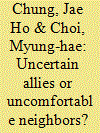| Srl | Item |
| 1 |
ID:
177666


|
|
|
|
|
| Summary/Abstract |
China’s policy of restraint (avoidance of crippling economic sanctions) towards North Korean provocation is typically explained in terms of geopolitical concern with North Korean regime stability. The strategic and diplomatic costs of restraint would suggest the presence of non-geopolitical influences behind China’s approach. Ideational explanations emphasise the persistence of shared socialist identity as well as the traditional Sino-centric worldview as shaping influences. There is much less detailed analysis of how China views North Korea’s political economic evolution and how this view has changed over time to produce fluctuations in the bilateral relationship. In order to capture China’s motivations more fully, I introduce two additional variables, namely China’s view of the state of its own reform path (which provides the domestic context shaping policy towards North Korea), and the extent of North Korea’s readiness to prioritise economic reform. I will then use these variables to explain two contrasting phases which represented the worst (1992–1999) and best (2009–2012) of times in the bilateral relationship in the post-Cold War era. These variables also help us to understand the potentials and limitations of the upturn in bilateral relations which has occurred since 2018.
|
|
|
|
|
|
|
|
|
|
|
|
|
|
|
|
| 2 |
ID:
123107


|
|
|
|
|
| Publication |
2013.
|
| Summary/Abstract |
This study is based upon two premises: (1) the available literature, though voluminous, fails to provide systematic understandings of the complex and evolving relations between China and North Korea; and (2) China and North Korea had been short of being trusted allies bound in blood and belief even before the launch of post-Mao reforms and the normalization of Beijing-Seoul relations. This article dissects this curious relationship into four questions: (1) What does history inform us about China's relations with (North) Korea? (2) Has China communicated effectively with North Korea? (3) Have China and North Korea been 'trusted allies'? (4) How effective has China been in inducing North Korea to comply with its demands over the years? The authors argue that, geo-strategically, China can hardly afford to put North Korea in an adversarial position. Furthermore, residues of the Factional Incident of 1956 and North Korea's deep-rooted suspicion of China still linger on. These have been the sources of Beijing's dilemma in consistently opting for 'soft' measures despite that North Korea's provocative acts and nuclear weapons programs have negatively affected China's interests. From the outset, China and North Korea had been more uncertain allies who had to cooperate with each other under the ideological and geopolitical imperatives of the difficult times. The authors also suggest that it would be misleading to put Sino-North Korean dynamics in a usual category of big power-small nation relations where power asymmetry generally works against the latter. North Korea has undoubtedly been an atypical 'small nation'. It is due to these limitations that China's pressurizing has not been always effective and that Beijing's reactions have been continuously cyclical. This cyclical trend is not likely to be broken since the upcoming drama of Sino-American rivalry is bound to close the window of such opportunities for China, which will nevertheless regard North Korea increasingly as a liability, if not uncomfortable neighbor.
|
|
|
|
|
|
|
|
|
|
|
|
|
|
|
|